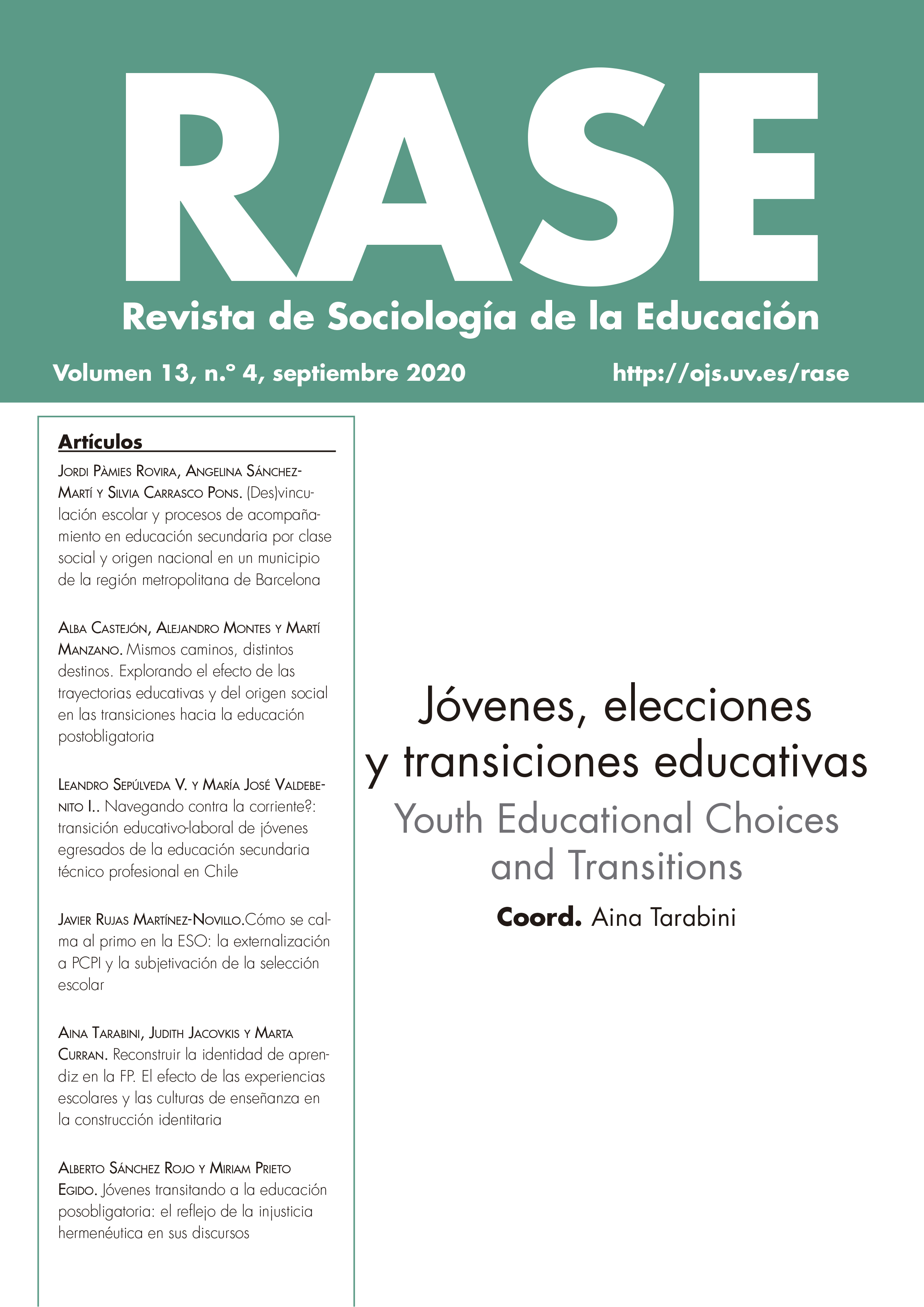Cooling the Mark out in Lower Secondary Education: Externalization to PCPI and the Subjectivation of Academic Selection
DOI:
https://doi.org/10.7203/RASE.13.4.18069Keywords:
Cooling out, initial vocational qualification programmes, externalization, school failure, moral career, educational trajectories Abstract
Abstract
This paper deals with the process of externalization of pupils from compulsory lower secondary education to external programs (PCPI). It describes the negotiations, interactions and strategies deployed in the process, as well as the actors involved and the subjective effects it has on the students. The paper is based on ethnographic fieldwork conducted in a state secondary school in Madrid, and draws on document analysis, participant observation and interviews with students and the school personnel. The proposal of referral to basic vocational training programs external to compulsory education constitutes a status degradation for the students, which are defined as unable to complete compulsory education. Pupils cope with it in different ways depending on previous damage of their academic situation and identities: they experience externalization either as relief or a personal failure; they either accept it or resist. The cooling out activity conducted by teachers and school counsellors, colluding or competing with parents and peers, manages to make pupils accept their downgrading and rebuild their identities. Students interiorize educational selection: eventually, they perceive it as the most reasonable option and they end up representing it a posteriori as an individual choice. This process has also an impact on their choice of vocational course: they make their choice, among other reasons, trying to compensate for their symbolic downgrading and in order to prevent future failures.
 Downloads
Downloads
 References
References
Becker, Howard S. (2009). Outsiders. Hacia una sociología de la desviación. Buenos Aires: Siglo XXI.
Bourdieu, Pierre (1979). La distinction. Critique sociale du jugement. París: Les Éditions de Minuit.
Bourdieu, Pierre (1994). Raisons pratiques. Sur la théorie de l’action. París: Seuil.
Casal, Joaquim, García, Maribel, & Planas, Jordi (1998): “Las reformas en los dispositivos de formación para combatir el fracaso escolar en Europa: Paradojas de un éxito”. Revista de educación, 317, 301-317.
Cicourel, Aaron V., & Kitsuse, John I. (1963). The educational decision-makers. Indianapolis: Bobbs-Merrill.
Clark, Burton R. (1960): “The «Cooling-Out» Function in Higher Education”. American Journal of Sociology, 65(6), 569-576. https://doi.org/10.1086/222787
Cuconato, Morena, & Walther, Andreas (2015): “‘Doing transitions’ in education”. International Journal of Qualitative Studies in Education, 28(3), 283-296. https://doi.org/10.1080/09518398.2014.987851
Garfinkel, Harold (1956): “Conditions of Successful Degradation Ceremonies”. American Journal of Sociology, 61(5), 420-424. https://doi.org/10.1086/221800
Goffman, E. (1952): “On cooling the mark out: Some aspects of adaptation to failure”. Psychiatry, 15(4), 451-463. https://doi.org/10.1080/00332747.1952.11022896
Goffman, E. (1959). The Presentation of Self in Everyday Life. Anchor.
Goffman, E. (1976). Asylums. Essays on the social situation of mental patients and other inmates. Penguin Books.
Grignon, Claude (1999): “Cultura erudita y cultura práctica”. En Mariano Fernández Enguita (Ed.), Sociología de la educación: Lecturas básicas y textos de apoyo (pp. 315-328). Ariel.
Hodkinson, Phil, & Sparkes, Andrew C. (1997): “Careership: A Sociological Theory of Career Decision Making”. British Journal of Sociology of Education, 18(1), 29-44. https://doi.org/10.1080/0142569970180102
Jociles, María Isabel, Franzé, Adela, & Poveda, David (2012): “La diversidad cultural como problema: representaciones y prácticas escolares con adolescentes de origen latinoamericano (Madrid)”. Alteridades, 22(43), 63-78.
Lahire, Bernard (2000). Culture écrite et inégalités scolaires. Sociologie de l’"échec scolaire" à l’école primaire. Presses Universitaires de Lyon.
Lahire, Bernard (2008): “Infancia y adolescencia: De los tiempos de socialización sometidos a constricciones múltiples”. Revista de antropología social, 16, 21-38.
Martín Criado, Enrique (1998). Producir la juventud: Crítica de la sociología de la juventud. Istmo.
MEC (2015). Las cifras de la educación en España. Curso 2012-2013. MEC. http://www.mecd.gob.es/servicios-al-ciudadano-mecd/estadisticas/educacion/indicadores-publicaciones-sintesis/cifras-educacion-espana/2014.html
MEFP (2020). Estadística de las enseñanzas no universitarias. Alumnado matriculado. Series (en línea, actualizado el 30 de junio de 2020). http://www.educacionyfp.gob.es/servicios-al-ciudadano/estadisticas/no-universitaria/alumnado/matriculado/series.html, consultado el 29 de julio de 2020.
Millet, Mathias, & Thin, Daniel (2003). “Remarques provisoires sur les “ruptures scolaires” de collégiens de familles populaires”. Les Sciences de l’éducation - Pour l’ère nouvelle, 36(1), 109-129.
Rujas, Javier (2017): “Dispositivos institucionales y gestión del fracaso escolar: Las paradojas de la atención a la diversidad en la ESO”. Cuadernos de Relaciones Laborales, 35(2), 327-345. https://doi.org/10.5209/CRLA.56776
Walther, Andreas, Warth, Annegret, Ule, Mirjana, & du Bois-Reymond, Manuela (2015): “‘Me, my education and I’: Constellations of decision-making in young people’s educational trajectories”. International Journal of Qualitative Studies in Education, 28(3), 349-371. https://doi.org/10.1080/09518398.2014.987850
Downloads
Published
How to Cite
-
Abstract891
-
PDF (Español)425
Issue
Section
License
![]()
This work is licensed under a Creative Commons Reconocimiento-NoComercial-CompartirIgual 4.0 Internacional.




